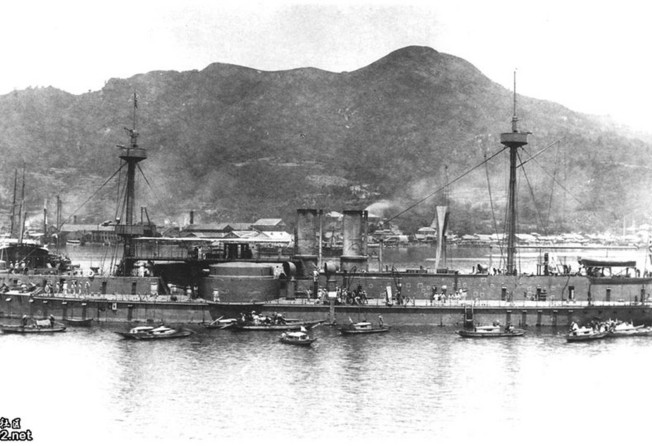
Blame Qing dynasty, not Chinese fleet, for 1895 defeat to Japan, senior PLA figures say
Senior PLA officers back exoneration of sailors of the northern fleet blamed since 1895 for Qing dynasty losing the first Sino-Japanese war

As China prepares to mark the 120th anniversary of the first Sino-Japanese war this year, there has been a groundswell of support in the highest echelons of the military to reassess the role of the Qing dynasty's northern fleet in China's humiliating loss to the Japanese.

It is the Qing government that should be blamed for the fleet's defeat in the first Sino-Japanese war, which lasted from August 1894 to April 1895, according to Deputy Admiral Ding Yiping , deputy commander-in-chief of the PLA Navy.
Ding's comments accompany an online compendium, including articles and illustrations, that compare the development of the northern fleet with the Meiji navy, which has appears on the website of the Global Times.
The party's leading propaganda outlets, including The PLA Daily, Xinhua and The People's Daily, have started running reviews of the period in contemporary Chinese history that some rank as its most shameful.
Earlier last month, PLA Air Force General Liu Yazhou, political commissar at the People's Liberation Army National Defence University, told the PLA Daily and Xinhua that China's defeat in the war was neither caused by the actions of the Qing navy nor its land forces, but by the antiquated dynastic political system and traditional modes of thinking.
In March, Major General Jin Yinan, a director of the strategic teaching and research department at the National Defence University, also wrote a commentary carried by Xinhua offshoot Reference News, saying the northern fleet (in Chinese, Beiyang) was a victim of a power struggle between political factions in the Qing government.
A day after Jin's commentary appeared, Reference News ran an editorial by Ding, the deputy admiral, arguing that the development of the fleet stopped after it was established on December 17, 1888, with top Qing officials failing to fund it.
Japan's Meiji government studied the naval forces of Western countries. The Meiji navy developed a comprehensive strategic plan before launching the invasion of China, Ding wrote, adding that Qing officials were unprepared for the outbreak of war.
"The defeat of the northern fleet was inevitable ... but who should take [the greatest responsibility]?" asked the deputy admiral.
Military experts note that it is rare for top PLA brass to take such a public stand on a matter such as the northern fleet.
The commentaries share a cautionary theme and are "aimed at preventing the PLA from following the same fate" as the Qing, Shanghai-based military expert Professor Ni Lexiong said, referring to the simmering territorial dispute in the East China Sea over the Diaoyu Islands, or Senkakus as they are known in Japan.
"The PLA, especially the air and naval forces, are facing great pressure," said Ni. "Many military leaders realise that now is a good time to give a fair evaluation of the Beiyang."
Although the fleets were roughly the same size, the balance of power tilted in Japan's favour when it came to firepower. According to Ni, the Chinese fleet had a tenth of Japan's firepower on the eve of war.
Ni, who has researched the first Sino-Japanese war for decades, has long called for the rehabilitation of the northern fleet.
The Chinese fleet was soundly defeated by the Meiji navy in January 1895 - a loss that resulted in the signing of the Treaty of Shimonoseki, or Maguan in Chinese, between the Qing and Japan's Meiji governments. China was forced to cede Taiwan and its affiliated islands, including the Diaoyus, to Japan and pay a war indemnity of 23 billion taels of silver.
Ding, the deputy admiral, also called for a blanket rehabilitation of the northern fleet's personnel, saying they should be praised as "national heroes" as most of them fought to the bitter end.
Although the Qing had three naval battle groups at its disposal, it was the northern fleet alone that faced off against the well-armed Meiji fleet. Sister fleets the Nanyang and Canton, also set up during the Qing dynasty, were deployed to guard coastal waters in the East and South China seas off Zhejiang , Fujian and Guangdong.